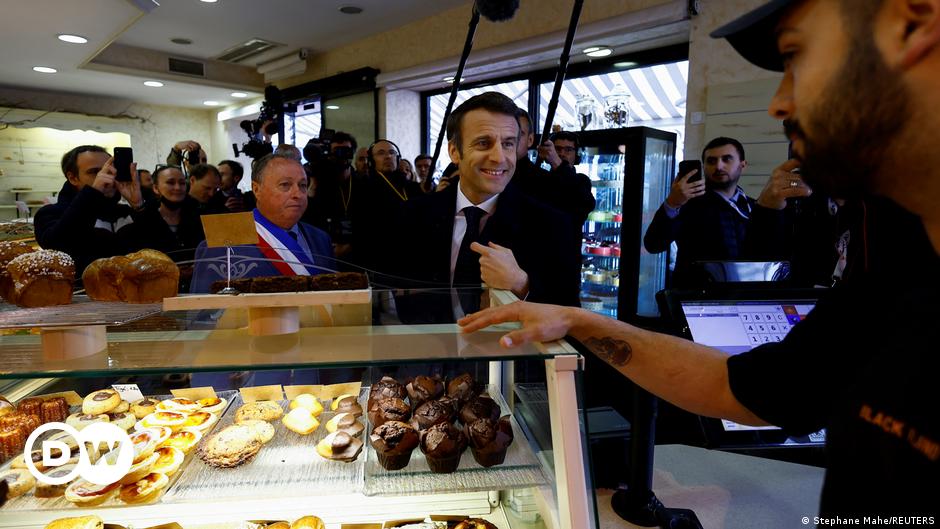
French President Emmanuel Macron held his first election rally on Saturday, ahead of the first round of voting in the country’s presidential election on April 10.
Macron spoke to tens of thousands of supporters in Nanterre, close to the French capital, in his only major appearance before the polls.
What did Macron promise voters?
Macron promised voters more social justice and support to improve their purchasing power amid fast-rising inflation in France.
“Our project for 2022, it’s solidarity and social progress,” Macron told supporters. “French people who work shouldn’t have to spend their whole salary filling up their petrol tanks and shopping, that’s unfair,” he said.
Working people should be able to receive a tax-free bonus of up to €6,000 ($6,620) as of the summer, according to Macron, who is running for his second term.
Amid soaring energy prices, Macron said his government had already put around €20 billion into capping electricity and gas prices.
Macron made his only rally appearance before the first round of the presidential election on April 10
In a swipe at his main rival, far-right leader Marine Le Pen, Macron warned of the risk of a Brexit-style election upset:
“Look at what happened with Brexit, and so many other elections: what looked improbable actually happened.”
“The danger of extremism has reached new heights because, in recent months and years, hatred, and alternative truths have been normalized,” he said. “We have got used to seeing antisemitic and racist authors on TV shows.”
Saturday’s rally comes after several weeks in which Macron has been more focused on international diplomacy over the war in Ukraine than domestic affairs, allowing Le Pen to gain ground on issues closer to home for the French public.
Watch video 04:31 War in Ukraine influences French presidential campaign
How are the candidates doing?
The latest survey by pollster Elabe, published on Wednesday, showed Le Pen winning 47.5% of the vote in a likely run-off against Macron scheduled for April 24.
The poll showed Macron gaining 52.5%, a reduced margin of victory compared to the same poll conducted a week earlier.
Le Pen has benefited somewhat from the candidature of Eric Zemmour, another far-right candidate, whose extreme positions on immigration and Islam have made hers seem almost mainstream in comparison.
Macron has gained support in some quarters for what is seen as his strong leadership over the Ukraine conflict.
However, he has suffered some image damage from the so-called McKinsey Affair, named after a US firm of consultants that was hired to advise the French government on its vaccination campaign during the pandemic, among other things.
The company was accused of tax evasion in a new French Senate report that also questioned the government’s use of consultants.
Le Pen confident of chances
In an interview with Le Parisien daily posted online on Thursday, Macron’s former Prime Minister Edouard Philippe warned that Le Pen “of course” could still win.
“If she wins, believe me, things will be seriously different for the country … Her program is dangerous,” he warned.
Le Pen herself has been very upbeat about her chances.
On a visit to eastern France on Friday, she said predictions of Macron’s easy re-election were “fake news.”
“It is perfectly possible to defeat Emmanuel Macron and radically change the politics of this country,” she said.
Other candidates in the election, including The Republicans’ Valerie Pecresse, Zemmour, the far-left Jean-Luc Melenchon, the Socialists’ Anne Hidalgo and the Greens’ Yannick Jadot, are widely seen as having virtually no chance of making it to the run-off.
Watch video 00:18 Macron on Ukraine: ‘This war will last’
Shift to the right
Macron’s rally comes as a study by think tank Fondapol, published on Friday, showed that France is currently in political crisis.
Not only had 80% of study participants lost trust in all political parties, but some 40% no longer felt attached to any movement, the poll indicated.
Just over a quarter of respondents said they would not be voting at all in the April elections.
The study also found that voters were shifting further to the right, with almost half (46%) highly likely to vote for an extreme right-wing or conservative right-wing candidate.
mm, tj/jcg (AFP, dpa)







